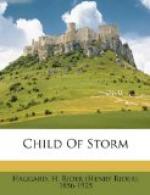He paused, and I saw the tears gush from his eyes—tears mingled with blood from the wound in his head. Then suddenly he uttered the battle-cry of “Laba! Laba!” and let his weight fall upon the point of the spear.
It pierced him through and through. He fell on to his hands and knees. He looked up at us—oh, the piteousness of that look!—and then rolled sideways from the edge of the rock.
A heavy splash, and that was the end of Umbelazi the Fallen—Umbelazi, about whom Mameena had cast her net.
A sad story in truth. Although it happened so many years ago I weep as I write it—I weep as Umbelazi wept.
CHAPTER XIV
UMBEZI AND THE BLOOD ROYAL
After this I think that some of the Usutu came up, for it seemed to me that I heard Saduko say:
“Touch not Macumazahn or his servant. They are my prisoners. He who harms them dies, with all his House.”
So they put me, fainting, on my horse, and Scowl they carried away upon a shield.
When I came to I found myself in a little cave, or rather beneath some overhanging rocks, at the side of a kopje, and with me Scowl, who had recovered from his fit, but seemed in a very bewildered condition. Indeed, neither then nor afterwards did he remember anything of the death of Umbelazi, nor did I ever tell him that tale. Like many others, he thought that the Prince had been drowned in trying to swim the Tugela.
“Are they going to kill us?” I asked of him, since, from the triumphant shouting without, I knew that we must be in the midst of the victorious Usutu.
“I don’t know, Baas,” he answered. “I hope not; after we have gone through so much it would be a pity. Better to have died at the beginning of the battle.”
I nodded my head in assent, and just at that moment a Zulu, who had very evidently been fighting, entered the place carrying a dish of toasted lumps of beef and a gourd of water.
“Cetewayo sends you these, Macumazahn,” he said, “and is sorry that there is no milk or beer. When you have eaten a guard waits without to escort you to him.” And he went.
“Well,” I said to Scowl, “if they were going to kill us, they would scarcely take the trouble to feed us first. So let us keep up our hearts and eat.”
“Who knows?” answered poor Scowl, as he crammed a lump of beef into his big mouth. “Still, it is better to die on a full than on an empty stomach.”
So we ate and drank, and, as we were suffering more from exhaustion than from our hurts, which were not really serious, our strength came back to us. As we finished the last lump of meat, which, although it had been only half cooked upon the point of an assegai, tasted very good, the Zulu put his head into the mouth of the shelter and asked if we were ready. I nodded, and, supporting each other, Scowl and I




